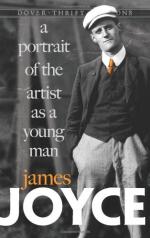|
|
A Portrait of the Artist as a Young Man Part 5, Section 2 (pg. 235-243) & 3 (pg. 243-269)
Stephen awakes inspired one morning and finally gets the words of his first poem down on paper, thinking as he does about his inspiration, the girl from the tram. It has been ten years since the evening he rode home with her. The poem, in its entirety, ends this section. It's nice (it repeats the lines: "Are you not weary of ardent ways," and "Tell no more of enchanted days" several times), though by no means is it a masterpiece.
Standing on the steps of the library, Stephen watches a flock of birds and thinks about how men have watched birds flying for ages and how his own name--Dedalus of the self-made wings--references flight. Stephen finds Cranly inside and takes him away from a chess game. Outside, he gets into another rambling conversation and the girl passes out of the library once more. Again she gets Stephen's mind spinning. He goes to a corner away from the other boys and the smell of her body fills his mind. It's the feeling of a louse crawling on his neck that pulls Stephen from these thoughts, indeed pulls him into a moment of despair. The bug reminds him quite clearly of his poverty.
Stephen summons Cranly for a walk across the city, and as he waits for his friend, Stephen looks through the windows of a high-class hotel with irritation--these comfortable elite, he thinks, will never be changed by art.
Stephen tells Cranly how he got in an argument with his mother because he doesn't want to participate in Easter ceremonies that ask him to display religious faith--his faith is waffling at best. Stephen, echoing the fallen angel Lucifer says,
"I will not serve." Part 5, pg. 260
Cranly and Stephen discuss this at length, Cranly arguing that Stephen should swallow his pride and do what his mother wants if it will make her feel better. Cranly and Stephen are here shown as having a crucial difference in character, and the implication is that Stephen's stubbornness may be what will make him the artist. The two pass a woman singing in her home, her voice drifting into the streets. Stephen says that he will probably have to leave Ireland to be an artist, and when Cranly asks him what he wishes to do with his life, Stephen tells him his answer is the same one he gave Cranly some time back:
"To discover the mode of life or of art whereby [my] spirit could express itself in unfettered freedom." Part 5, pg. 267
And Stephen goes on to develop this.
"I will tell you what I will do and I will not do. I will not serve that in which I no longer believe whether it call itself my home, my fatherland or my church: and I will try to express myself in some mode of life or art as freely as I can and as wholly as I can, using for my defense the only arms I allow myself to use--silence, exile, and cunning." Part 5, pg. 268
And these things, Stephen says, he does not fear,
"I do not fear to be alone or to be spurned for another or to leave whatever I have to leave. And I am not afraid to make a mistake, even a great mistake, a lifelong mistake and perhaps as long as eternity too." Part 5, pg. 269
Cranly, his voice full of seriousness, asks Stephen if he is fully aware what that means, to have not even one friend.
Topic Tracking: Religion 13
Topic Tracking: Art 12
Topic Tracking: Modernism 11




